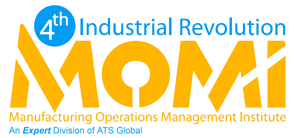The ISA-95 standard “Enterprise – Control System Integration” provides an information model used to define the interface between control functions and other enterprise functions, comprising a standard terminology and a consistent set of concept and models.
Now, in the era of the 4th Industrial Revolution, new technologies are introduced making existing technologies obsolete. However, ISA-95 does not become dated over time the way technology would. It provides a smarter way to push ahead. An information model is not the same thing as infrastructure, nor is it a protocol. Information is about the material that needs to be processed, shipped and handled. Infrastructure and protocols are the means by which we transport that material information. They compliment each other; they are not the same. ISA-95 works to improve manufacturing information clarity, structure and consistency independent of anything involving an implementation using either legacy or current technology. ISA-95 is technology-agnostic.

Now, in the era of the 4th Industrial Revolution, new technologies are introduced making existing technologies obsolete. However, ISA-95 does not become dated over time the way technology would. It provides a smarter way to push ahead. An information model is not the same thing as infrastructure, nor is it a protocol. Information is about the material that needs to be processed, shipped and handled. Infrastructure and protocols are the means by which we transport that material information. They compliment each other; they are not the same. ISA-95 works to improve manufacturing information clarity, structure and consistency independent of anything involving an implementation using either legacy or current technology. ISA-95 is technology-agnostic.
The ISA-95 standard still contributes to improved communication between all parties involved, enabling users to better identify their needs, reducing costs of automating manufacturing processes and reduce lifecycle engineering efforts, as it has done for about two decades and will do into the future.
This comprehensive 2-days course will lead you through all seven current parts of the standard. By group discussions and pragmatic exercises, you will discover how to determine:
- Scope of manufacturing operations
- Activities with respect to production, maintenance, quality test and inventory operations
- Information that must be shared between control functions and enterprise functions
You will cover:
- Manufacturing processes, like detailed scheduling, dispatching, execution, data aquisition, tracking, performance analysis, resource management and definition management
- Information models and objects, like operations resources, operations/process segments, production definition and capability, operation schedules, operation performance
- Demarcation between Enterprise Planning (ERP) and Manufacturing Operations Management (MES/MOM)
- and much more
|
|

18 – 19 September 2019
Haarlem, The Netherlands
Instructor(s): Jan Snoeij
Registration Fee: EUR 1595
MS003 – MES/MOM Standardization using ISA-95 (2 days)
MS004 – Integrating Manufacturing (MES/MOM)
MS011 – MOM Standardization using ISA-88 (Batch Control)
MP001 – Metrics Framework for Manufacturing Performance
MP011 – Continuous Improvement in Manufacturing
MA001 – Manufacturing Maturity to Improve Performance
MA011 – Business and IT Alignment in Manufacturing
MA031 – Enterprise Recipe Management for Improved NPDI
